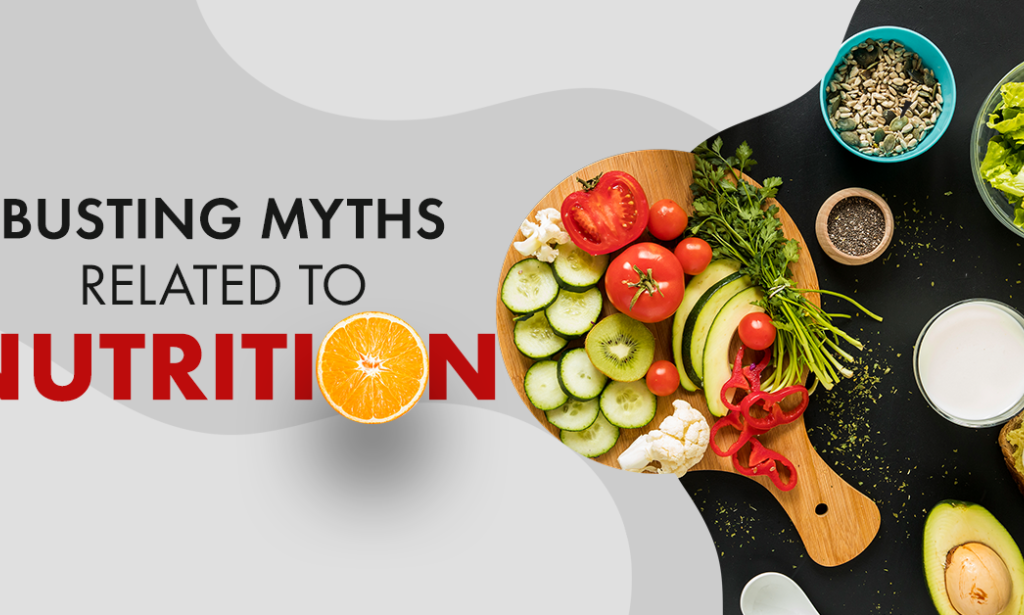INTRODUCTION:
Nutrition is a topic that’s often surrounded by confusion and misinformation. The world of healthy eating can be overwhelming, with countless diets, rules, and trends popping up regularly. Many people fall prey to common nutrition myths that can prevent them from making healthier choices or lead them to unnecessarily restrictive eating habits. In this article, we’ll debunk some of the most widespread myths about nutrition and healthy eating, helping you separate fact from fiction and embrace a more balanced approach to food.

Myth 1: Carbs are Bad for You and Should Be Avoided
One of the most enduring nutrition myths is that carbohydrates are inherently bad for health and should be eliminated for weight loss. In reality, carbohydrates are an essential macronutrient that provides the body with energy. The key lies in choosing the right types of carbs.
-
Complex Carbohydrates vs. Simple Carbohydrates: Whole grains, fruits, and vegetables are rich in complex carbohydrates, which provide fiber, vitamins, and minerals. These carbs are digested slowly, helping to maintain steady blood sugar levels and provide lasting energy. On the other hand, simple carbohydrates, like those found in sugary snacks and drinks, are quickly digested and can lead to blood sugar spikes and crashes.
-
Healthy Carbs Are Essential: Carbs should be a central part of a balanced diet. They fuel your brain and muscles, especially during physical activity. It’s important to focus on whole foods and unprocessed carbs, rather than cutting them out entirely.
Myth 2: Eating Late at Night Causes Weight Gain
Another common myth is that eating late at night causes weight gain, but this is more about the overall quality and quantity of food consumed, rather than the timing.
-
Calories in vs. Calories out: Weight gain occurs when you consistently consume more calories than your body burns, regardless of the time of day. Eating late at night won’t necessarily lead to weight gain if you’re mindful of your portion sizes and total calorie intake.
-
The Role of Sleep: However, it's important to note that late-night eating can disrupt sleep patterns, which can affect metabolism and hunger hormones, potentially leading to overeating or poor food choices the following day. For most people, a balanced dinner a few hours before bedtime is ideal for good digestion and restful sleep.
Myth 3: All Fats Are Bad for You
Fats have long been vilified in the world of nutrition, with many diets promoting "low-fat" as the healthiest choice. However, not all fats are created equal. In fact, healthy fats are vital for bodily functions.
-
Healthy Fats vs. Unhealthy Fats: Unsaturated fats, found in foods like olive oil, avocados, nuts, and fatty fish, are beneficial for heart health and can help reduce inflammation. These fats also play a role in hormone production and cell structure. On the other hand, trans fats and excessive saturated fats, found in many processed and fried foods, should be limited as they can raise LDL (bad) cholesterol levels and increase the risk of heart disease.
-
Moderation is Key: Fats should be consumed in moderation as part of a balanced diet. Including a variety of healthy fats in your meals can provide essential nutrients while promoting overall health.

Myth 4: You Need to Detox with Special Diets or Products
The idea that the body needs "detoxifying" through special juices, cleanses, or supplements is a widespread myth. While it’s true that the body is exposed to environmental toxins, it has its own built-in detoxification system: the liver, kidneys, and digestive system.
-
Natural Detoxification: The liver processes waste, and the kidneys filter toxins from the blood. A healthy diet that includes fruits, vegetables, fiber, and plenty of water can support the body’s natural detox processes. There is no need for expensive detox diets or supplements.
-
Avoiding Fads: Many detox diets are short-term solutions that promise quick results, but they are often unsustainable and can deprive the body of essential nutrients. Instead of focusing on detoxing, aim for consistent, balanced eating habits that support the body's natural functions.
Myth 5: All Calories Are Equal
Not all calories are created equal. While it’s true that weight loss is ultimately about managing calorie intake versus energy expenditure, the nutritional value of those calories matters significantly.
-
Nutrient Density: A 200-calorie snack from a candy bar is vastly different from a 200-calorie snack from a handful of almonds. The candy bar provides little nutritional value beyond sugar and empty calories, while the almonds provide healthy fats, fiber, and protein, which contribute to satiety and overall health.
-
Quality Over Quantity: Instead of solely focusing on calorie counts, prioritize nutrient-dense foods that provide vitamins, minerals, fiber, and antioxidants. A balanced diet made up of whole, unprocessed foods will be much more beneficial in the long run than a restrictive, calorie-counting approach.
Myth 6: Skipping Meals Helps You Lose Weight
Many people think skipping meals, especially breakfast, can help them lose weight by reducing calorie intake. However, this approach can actually have the opposite effect.
-
Slowing Metabolism: Skipping meals can lead to a slowdown in metabolism as the body enters "starvation mode" to conserve energy. This can result in overeating later in the day when hunger strikes, making it harder to stick to healthy eating habits.
-
The Importance of Regular Meals: Eating regular, balanced meals helps maintain stable blood sugar levels and keeps your metabolism running efficiently. Skipping meals can also leave you feeling fatigued, irritable, and less likely to make healthy food choices.
Myth 7: Supplements Can Replace a Healthy Diet
Supplements have become increasingly popular, with many people relying on them to "fill in the gaps" in their nutrition. However, no supplement can replace a well-rounded, nutrient-dense diet.
-
Whole Foods Over Supplements: While certain supplements may be beneficial for specific health needs (such as vitamin D or iron deficiency), they cannot replicate the wide range of nutrients, fiber, and antioxidants found in whole foods. Eating a variety of fruits, vegetables, lean proteins, and healthy fats is the best way to ensure you’re getting all the nutrients your body needs.
-
Quality Supplements: If you do take supplements, it’s important to choose high-quality, reputable brands and consult with a healthcare provider to ensure they’re appropriate for your needs.

Conclusion
Nutrition can be confusing, especially with the constant stream of new trends and information. However, many common nutrition myths are based on misinformation and misunderstandings. By debunking these myths, we can gain a clearer understanding of what truly constitutes a healthy diet. Instead of adhering to restrictive fads, focus on eating a balanced, nutrient-dense diet that includes a variety of whole foods. A sustainable, long-term approach to healthy eating, grounded in science, will not only improve your overall health but also empower you to make informed choices for a lifetime.


You must be logged in to post a comment.